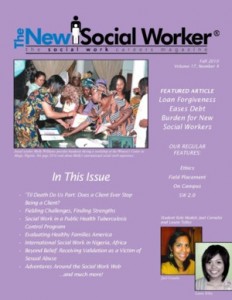Are you wondering how flexible the social work field is in terms of professional opportunities?
As per Linda Grobman, MSW, LSW, CMP, the “opportunities for you as a social worker are wide open! It is such a broad and varied field, and there is always something new to learn. Don’t feel that you are tied down to just one area of the profession. Your skills are transferable from one setting to another.”
Linda Grobman is the founder, publisher and editor of The New Social Worker, as well as the editor of several social work books. Some of you may be familiar with her via her twitter handle @newsocialworker.
Within Social Work and Music Therapy, the first part of our interview, Linda shared some of her experiences and knowledge of the exciting world of music therapy and the provision of therapeutic music services.
This post is part two of that interview. Linda will be sharing a bit of her writing, publishing and career development background within the social work arena. In addition, she has some valuable career guidance to offer social workers based upon her expertise in the social work career development field.
Linda, can you briefly describe your career trajectory of how you first started out and how your initial steps led you to establish the “New Social Worker” Magazine?
In my MSW degree program, I focused on the mental health concentration. To me, no matter what setting a social worker works in, I think mental health is a factor. So, my first job after grad school was in a public inpatient mental health facility, working with adults in an acute unit.
I got great experience there working as part of a treatment team. I later worked as a social worker in a children’s hospital, an advisor to a campus organization for college students, and a few other things. I was on the staff of two state chapters of NASW.
In all these jobs, besides doing traditional social work tasks, I gravitated toward writing, whether it was a departmental newsletter, writing letters to the editor, writing educational brochures for clients and families, or eventually editing the state NASW newsletters.
At that time, there were no blogs, or even Web sites, or I’m sure I would have been doing that, too. I also had a big interest in social work careers–how others were developing, as well as how mine was developing.
So, I had the idea to start a social work careers magazine–sort of the publication I wished had been around when I was a student and new social worker starting out. And after my son was born, the time seemed right, so I took the leap and started my own social work publishing company and started The New Social Worker magazine.
And how did you move on to editing/publishing “Days in the Lives of Social Workers” and other social work books?
That was another idea I had around the same time I thought of doing the magazine, but I waited to get the magazine off the ground first. The magazine started in 1994, and the first version of its Web site went live in 1995.
I taught myself HTML by reading a book on the subject, and created the Web site the next day. The first edition of Days In The Lives Of Social Workers came out in 1996.
I really wanted to put together a book that would show readers the variety of opportunities for professional social workers, and I thought the best way to do this would be to collect real-life stories from people about what they do. I did a lot of research on the book publishing business, and when I felt ready to do it, I sent out a call for submissions for the book.
Again, this was before there was as much online networking as there is now. There was no “social networking” as it exists today. I did send out the call to a few listservs, and also sent it to print newsletters and other publications.
The book has been used in “Intro to Social Work” and other classes, and from what I’ve been told, has helped a lot of folks decide to go into social work or decide on an area of specialization. My company eventually published other books for social workers and nonprofit managers, some of which grew out of the magazine.
Also, to help social workers find jobs and to help employers find social workers, I developed SocialWorkJobBank.com, which grew out of The New Social Worker’s Web site.
What are the parts of your work within the social work career development field that you find most enjoyable?
In career development, it is very exciting to hear about what new social workers are interested in and to help them find their passions in the profession. I get to interact with interesting people–students, professionals, educators–all over the country and around the world.
And what are the aspects that you find most difficult/challenging?
There is always a lot to do and little time to do it, so time management can be a challenge. I didn’t take any business courses in school, so I have had to learn a lot about that.
There can sometimes be a conflict, real or perceived, between “thinking like a social worker” and “thinking like a businessperson.” I think this is true for any social worker who goes into business for him/herself, whether in private clinical practice or some other kind of business, like publishing.
What career advice would you offer to upcoming MSW graduate students who would be interested in being employed within the social work career development publishing/writing arena?
There are opportunities to get published in the social work field. You can start out by contributing articles to a newsletter at your place of employment, a professional association newsletter, or a local newspaper. Offer to write book reviews.
Some of the larger schools of social work have their own career development centers, and most universities have a general career development center, so this is an area of potential employment for social workers who would like to provide career counseling to students.
Which professional associations do you feel are important for social workers for continued career development and networking opportunities?
NASW is the largest professional association in the U.S. for social workers and has chapters in every state. I would recommend that social workers join and become INVOLVED in this and/or other associations.
In addition to hosting local, state, and national workshops, conferences, and other events, NASW provides online opportunities for networking through Facebook, LinkedIn, Twitter, and SocialWorkChat.org (also co-sponsored by The New Social Worker).
There are many more specialized social work organizations, including clinical, oncology, forensic, school, and numerous other social work organizations. You can start getting actively involved by attending meetings, then being on a committee, and working your way up to leadership positions.
You seem to be stressing that a social worker should work her way up to a leadership position at NASW or another social work organization. Why are you recommending such an approach?
Let me provide some clarification. I realize that not every social worker will necessarily want to be an officer in professional associations. I think that being involved in some way has a lot of advantages career-wise.
Involvement can be anything from attending meetings regularly to giving input on current issues to serving on a planning committee to running for office within the organization.
One major advantage of active involvement is that it is an excellent way to network with colleagues, become known in the professional community, and make connections with potential employers or collaborators. It’s a great way to meet people who might be role models or mentors.
Another advantage is that you can gain some marketable skills that you won’t necessarily have learned in school or in your place of employment. I think it also gives you a richer experience as a professional. I think it’s part of being in the profession of social work, rather than social work “just” being a job.
Finally, what key pieces of advice do you think every graduating MSW student should be told as they venture out into the real world?
The opportunities for you as a social worker are wide open! It is such a broad and varied field, and there is always something new to learn. Don’t feel that you are tied down to just one area of the profession. Your skills are transferable from one setting to another.
Seek out opportunities to use your special interests and talents, whether it is in the area of writing or music or something else. Realize that it is an ongoing learning experience and you may experience a healthy level of anxiety.
What suggestions would you give upcoming graduating MSW students in terms of finding work in today’s climate?
I would use every available legitimate means of finding work. I would look in newspapers, professional association newsletters, as well as general and social work-specific online career sites. If your school has a career center, take advantage of its services.
For as long as I’ve been in the world of work, networking has been emphasized as important in the job search. The term “networking” often refers to online social networking these days, but don’t forget about the old-fashioned person-to-person, face-to-face networking. You never know who might know of a job lead.
I would seek out activities in the community related to my areas of professional interest. I think new MSW graduates today need to really make themselves stand out in the crowd. They need to make sure that their resumes are flawless. Being open to a variety of settings and locations can help expand their opportunities.
They need to be aware that anything on their social networking profiles might be seen by potential employers or someone who knows of a potential employer. So, they need to be sure that they are projecting the image that they want to project.
They need to be very familiar with the Code of Ethics and with licensure laws in the state where they want to work. Finding a professional position can take a while, so I would say to be persistent and patient when looking for a first position out of grad school, and to be realistic in your expectations.
Could you please clarify what you mean by being “realistic in your expectations?”
That’s a good question. I don’t think that new social workers are necessarily unrealistic. One area where this might come into play, though, is in the amount of time it takes to land a post-MSW job. It may take longer than expected. I read recently that the average amount of time to find a job in the U.S. is now 7.5 months.
Keep in mind that the 7.5 months is an average for all jobs, so it’s not social work-specific. While I have known people who found a post-MSW job in much less than 7.5 months, I have also heard stories of new MSWs taking even longer to find a job. So, it does vary, depending on a number of factors. However, I think in general, that it probably takes longer than some might think.
Also, the first job after getting an MSW may not be the ultimate dream job that a person would like to have. So, I’m saying to be open to all opportunities that might help them get closer to that goal. If they do happen to find that dream job the first time out, that’s good, too!
Thanks so much, Linda for sharing with us all this great career advice!
As always, please feel free to ask any questions or make any comments. Your feedback is most appreciated 🙂
Spiral Texture by Patrick Hoesly
Macro Purple Flower Petals by D Sharon Pruitt





Great interview–Linda, I think you’re a wonderful inspiration, especially in your writing and publishing endeavors.
Many social workers struggle with the idea of bringing social work and business perspectives together. Can you say more about how you see these things fitting together? Also, do you think we should have coursework in MSW programs that includes business perspectives? If so, what are your thoughts about how to do that?
Thanks, Nancy. I think that students who hope to go into administration/management could definitely benefit from coursework on management skills, budgeting, marketing, and so forth. I know that some schools of social work do have nonprofit management courses or even certificate programs in nonprofit management. (My company publishes some textbooks in this area, which are used in schools of social work.) Some social workers will be in for-profit management and/or private practice or other entrepreneurial endeavors, and they could also benefit from courses in how to run a business. These could be electives (within the school of social work or from other schools/departments), or they may get these courses as continuing education/noncredit courses on their own.